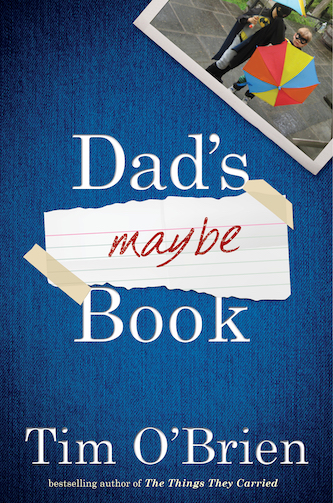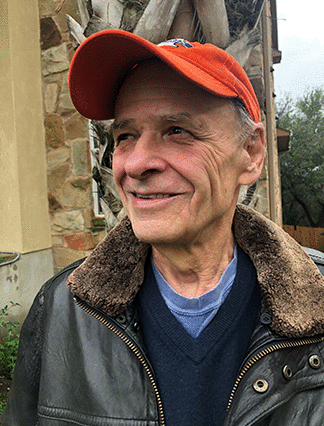Author Interview: Tim O’Brien — The Sound of a Father’s Voice
By Blake Maddux
I wanted to give my kids this gift of a book about them and for them.

“If I were to vanish from their lives at this instant, my sons would have no recollection of their father’s face or voice or human presence.”
This might seem like an odd thing for the father of a three-year-old and an infant to say. However, hardly any fathers of such young children are only a few months away from their 60th birthday, as William Timothy “Tim” O’Brien Jr. was when he wrote this sentence.
This is one of the many poignant moments from Dad’s Maybe Book (Houghton Mifflin Harcourt), O’Brien’s first publication since his 2002 novel July, July. He is also the author of the 1978 National Book Award–winning Going After Cacciato and the 1990 Pulitzer Prize for Fiction finalist The Things They Carried, both of which drew heavily from the well of experiences that he had as a Vietnam War soldier.
Unlike O’Brien’s seven novels, Dad’s Maybe Book is entirely nonfictional. However, it isn’t entirely a catalog of events that have comprised his 73 years of life. Rather, as he recently told me in a phone interview, “I wanted to give my kids this gift of a book about them and for them. Stories about my own life and stories about their lives. So when they’re middle-aged or as old as I am, they’ll at least have the sound of their father’s voice.”
As such, it is a collection of — among other things — briefly noted moments that would have most likely been forgotten: letters from a father to his sons, detailed chapters about a Purple Heart recipient’s experiences in Vietnam and O’Brien’s fondness for Ernest Hemingway.
Interspersed throughout is the older father’s recognition that, as he writes, “Where a younger father might tell his children he loves them 60 thousand times over a lifetime, I feel the pressure to cram those 60 thousand I-love-yous into a decade or so, just to reach my quota.”
O’Brien spoke to The Arts Fuse from his home in Austin, TX, ahead of his appearance at the Boston Book Festival on Saturday, October 19.
The Arts Fuse: How long have you lived in Austin and why did you decide to move there?
Tim O’Brien: We moved here in 1999. So 20 years, exactly. I hadn’t thought of that! I kind of moved because I’d lived in Boston and Cambridge for so long that I just wanted to see some other part of the world. I thought I’d be in Texas for a year at most. I did come for a teaching gig, but I just thought I’d leave as soon as it was over. Instead, I got married and got a house.
I still think of the Boston area as home.
AF: You write in the book that you “very much did not” want kids. Was it something specific that brought about that resolve?
O’Brien: I think it was a combination of things. Essentially it was fear, fear of a lot of different things. Fear of keeping my child alive. How could I possibly manage that? I feared that I’d lose my independence, that I would end up resenting having children.
There was also an element of selfishness involved. I was writing 12 to 15 hours a day. I’m a slow writer. I feared I would stop writing. As it turned out, I did stop, and I did it by intention. I told myself, “If nothing else, I am going to be a good father.” And you can’t do that when you’re at a typewriter or a computer 12 hours a day, including weekends. And when you’re not at the typewriter or the computer, you’re worried about it.
Another thing that probably was part of it was that my dad was a terrible alcoholic. He was institutionalized twice that I know of for long periods of time. The house was full of tension, sadness. I’m not sure if my dad even liked me, much less loved me. He’d never say so. I did not want to have happen to my kids what happened to me.
AF: How did you deal with the issue after you married someone who “very much wanted” to have children?

Author Tim O’Brien. Photo: Timmy O’Brien.
O’Brien: She wasn’t going to marry me if I didn’t say I’d have children with her. We broke up over that for two or three weeks and then finally got together in Cambridge at a restaurant to talk it out for seven or eight hours. And I came to the realization that I wanted a normal, happy family life, too. And I’m so glad I said, “Okay.”
AF: You described your relationship with your father, whom you are named after, as being a bit fraught. Why did you decide to name your first child William Timothy O’Brien III?
O’Brien: I idolized my father. He was funny, intelligent, well-read, articulate. People just loved him. My friends used to say to me, “I wish he were my father.” They didn’t know what was happening inside our house and the nightmare that was occurring. Much of my childhood was a mixture of fear that he’d hurt me and sadness over what I could see physically happening to the man. But I did, at the same time, love him and idolize him.
AF: How much time passed between the first thing written for this book and the last thing?
O’Brien: 17 years passed. Every year or two I’d write a little love letter to the kids. I’d pick a topic, something they’d done or something about my own background and I’d let them hear from their dad. And I did this for seven years of so just every now and then. Then one day, Tad [the nickname of his younger son, whose name is Trevor] saw this stack of pages, maybe 40 of them, and asked me if that was going to be a book. I said I didn’t know. These pages often end up in trash cans when you’re a writer. And I said, “Maybe.” That’s when he got kind of stern and said, “Well you should call it what it is. Call it your “maybe book.” That’s when the title was born. I didn’t invent it; this little seven-year-old kid did! I didn’t take it right away. I feared people would think I was writing a parenting book. I’m not and I didn’t. It is not a book of advice.
AF: Why is Ernest Hemingway the subject of five relatively long chapters?
O’Brien: I chose somebody with whom my kids could identify. His diction isn’t high. You can read his stories and understand them when you’re the age of my children. I could have chosen from any number of writers I admire. And I don’t totally admire Hemingway. It’s a love/hate thing. I love his beautiful short stories. They’re magical and almost word-perfect. Other things I quarrel with. That’s what I wanted to teach my kids: to argue with and talk to the books they’re reading. Argue with Aristotle, complain to Plato. That way you’re immersed in a book. So the object was to choose one writer and be pretty thorough in talking to my kids about him and in writing about him. And I had to choose a writer that most Americans know about or have read.
AF: How did you become a writer and consultant on the Vietnam War–themed episodes of This Is Us last year?
O’Brien: That was simple. I was just called and asked if I was interested. It’s a really well-written show and I was interested because it was a well-written show. I did it also because it was something new. I had finished Dad’s Maybe Book and I wasn’t writing anything else. It was so fun. A television show is different from a book. On a television show, you’re not responsible for everything. There are actors and lighting people and script people, directors, and all the other people. So if people don’t like it it’s not my fault, you can tell yourself! It was enjoyable to watch the script became a real thing right in front of your eyes, so there was a real joy in doing it.
Blake Maddux is a freelance journalist who regularly contributes to the Arts Fuse, the Somerville Times, and the Beverly Citizen. He has also written for DigBoston, the ARTery, Lynn Happens, the Providence Journal, The Onion’s A.V. Club, and the Columbus Dispatch. A native Ohioan, he moved to Boston in 2002 and currently lives with his wife and one-year-old twins–Elliot Samuel and Xander Jackson–in Salem, Massachusetts.
